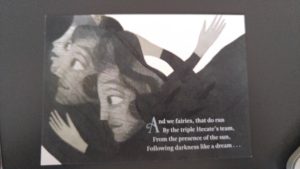I may have mentioned my daughter is studying Romeo and Juliet. Her teacher knows about our history and knowledge of the subject. So the other day at dinner, my daughter told me, “Oh! My teacher told me to call you a man of wax, and see how you react.”
They are referring to Nurse’s opinion of County Paris in Act 3 Scene 5:
LADY CAPULET
The valiant Paris seeks you for his love.Nurse
A man, young lady! lady, such a man
As all the world–why, he’s a man of wax.
My other daughter asked what man of wax means, so my oldest explained that it means perfect, like a sculpture. I think it’s the wax that throws people off. If she’d said, “he’s like a bronze sculpture” or “he looks like he was carved out of granite,” I think it would be more obvious, but it would also imply that Paris is some imposing physique, and that’s not the case here. He’s not solid like a rock; he’s shiny like wax.
I took it as insulting. I’ve always understood the term to have an implication of “all looks, no substance, empty inside.” I explained this, and my daughter said, “Well, yes, but we haven’t read that far yet. We don’t know anything about Paris’ character.”

Which I thought was a good point. I’m interpreting it with the audience’s knowledge that although Paris looks good “on paper,” he’s ultimately not her true love. But Nurse obviously means it in the more superficial “I like what I see” sense. It’s really about how Juliet takes it. She’s not really in the market for a man of wax. It’s a juxtaposition between the superficiality of County Paris, who’s just in the market for a wife and going through the motions, and Romeo, who has deep feelings for Juliet and is ready to break them all.
No real groundbreaking revelation here, just one of those moments where you have to separate how you, the audience interpret something from how the actual speaker means it and how it is taken.






